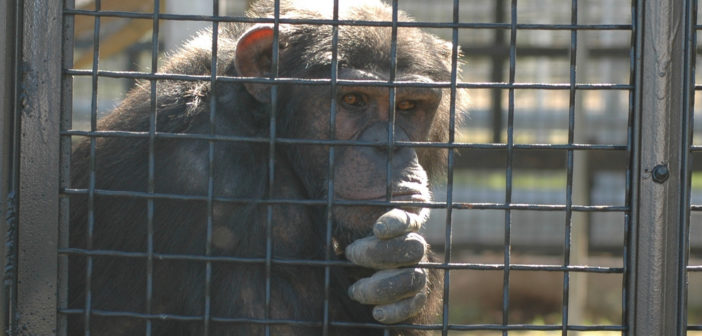The shooting of a chimpanzee at a zoo in Langkawi, Kedah in Malaysia has attracted much publicity since being highlighted by animal rights activists. Friends of the Earth Malaysia (FOEM) raises concerns both about the lethal response to the incident and the continued treatment of the zoo’s surviving chimpanzees.
Why was the chimp shot? Because she made a daring escape from her night den, into her daytime enclosure and finally into the open. A sad and tragic ending for a chimp who had lived a life of misery along with her two companions. Neither the Bukit Gambang Safari Park, where they were incarcerated in dingy 3m by 4m enclosures for close to three years, nor the Langkawi Nature Park (LNP) to which they were recently transferred – both owned by the Sentoria group – allowed for a good quality of life for the three chimpanzees.
Adult chimps can be very dangerous, and they can pose a threat to people in zoos if they escape. But zoos must also be prepared to use humane, non-lethal methods of subduing chimps and other escaped wildlife, such as a tranquiliser dart or net. At the time of this particular incident, the zoo was closed to the public, and so no visitors were in immediate danger.
Serious questions need to be raised immediately about how an adult chimp managed to escape, and why the animal was shot dead. Zoos are required to ensure that enclosures and boundary fencing are designed and maintained to prevent escapes. Obviously LNP is substandard and should be held accountable for the chimp’s escape in the first place.
Judging from their observed banging on the cages, the chimps at LNP are not receiving proper enrichment and stimuli. This is a type of behavior often seen in animals who are closely confined, lack proper care and habitat areas, and have little opportunity for mental stimulation or physical exercise. In the wild chimps live in large groups. In captivity, it is psychologically damaging for them to be kept in small barren cages because they lack mental stimulation and the company of their own kind.
Is the wildlife department aware of the plight of the chimps kept in the Bukit Gambang and Langkawi zoos? If the department has an eye for detail then they should take action against the zoo’s management for the psychological abuse the animals suffer.
The Zoo Licensing Act should be amended to force zoo managers to ensure the psychological needs of the animals are met. The only welfare protection zoo animals currently have is not to be treated cruelly. The fact that an animal is not able to behave in a normal way for its species is not legally considered cruelty. This means that local zoos can continue to house animals in spaces likened to a “menagerie from the last century.”
Wildlife officials need to heed increased public awareness of the suffering of captive animals and listen to wildlife experts who recommend that zoos be phased out. FOEM believes that visitor experience at zoos should not be considered more important than animal welfare.
As for prospective visitors, if one is truly concerned about the impact that zoos have on animal welfare, it is best to stay away from zoos and businesses that hold animals captive for profit and entertainment.
S M Mohd Idris
President
Friends of the Earth Malaysia (FOEM)
Featured image courtesy Kim Bartlett / Animal People, Inc.





